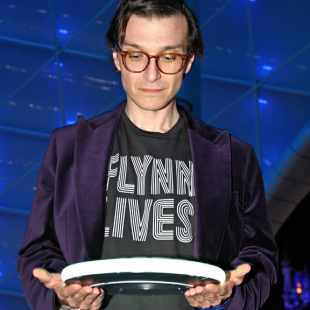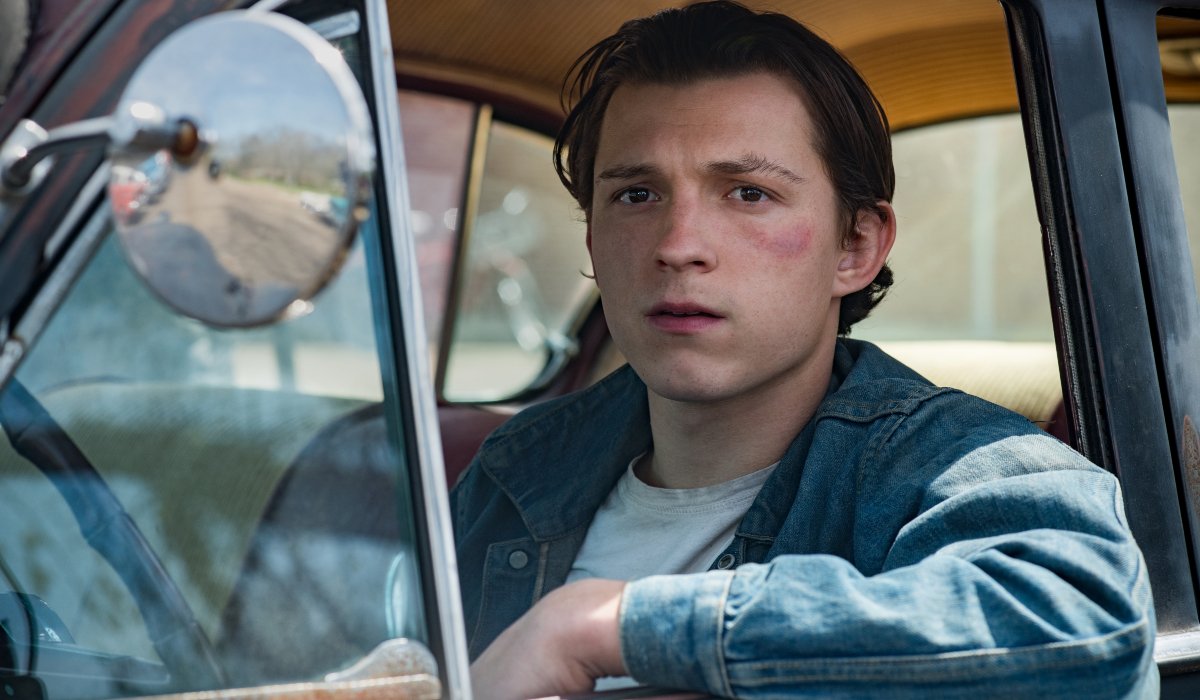We’re getting to the point in the year when audiences see some of the usual formulas rearing their heads at the movies. You can totally see it in director Antonio Campos’ film The Devil All The Time, as it fills quite a few slots in the fall season bingo game. A cast of talented actors? Check. Period specific aesthetic that supports the action on screen? Two for two. You could even count the fact that the movie is based off of a book as a free square, and you’re most of the way towards filling out a card that, usually, yields something either really entertaining or heartbreakingly pretentious. Somehow, the new film strikes precarious middle ground; as there’s enough interesting material to want it to work, but it’s presented in such a disappointing way that it still manages to crush your hopes to a certain extent.
Told across two generations, The Devil All The Time focuses on the real town of Knockemstiff, Ohio through some very unreal characters. As we watch father Willard Russell (Bill Skarsgaard) and eventually his son Arvin (Tom Holland) struggle with religious conviction and how it influences their development as people, events start to take shape that further mold them into the men that they eventually become. Ultimately, choices are presented to both men that changes them forever, with the lives of those they love hanging in the balance.
The Devil All The Time juggles more story and characters than it can handle.
Author Donald Ray Pollock’s original novel contains a story that is told over seven distinct parts, with a handful of characters all weaving in and out. On the page, this approach works quite naturally for a sprawling story like The Devil All The Time, and in the right sort of adaptation this material would be a shoo-in for an epic on par with Netflix’s ambitious experiment with The Irishman. The large problem that besets this adaptation is that it isn’t a long enough movie to properly tie all of the threads Antonio Campos and co-writer Paulo Campos introduce throughout.
On top of Willard and Arvin’s story, there’s other arcs present involving folks like the woman Willard was supposed to marry upon coming home from World War II (Mia Wasikowska), a married pair of sadistic murderers hitting the road in search of victims (Riley Keough and Jason Clarke), and a town sheriff who’s more worried about his constant re-election campaigns than doing his job (Sebastian Stan). All of those arcs do tie together by time The Devil All The Time concludes, but there’s not enough thematic tissue to render it an entirely satisfactory result.
Out of the several story arcs presented, Tom Holland and Robert Pattinson’s conflict provides the best, clearest thread.
The thread that The Devil All The Time should have made more of its narrative center follows Tom Holland’s Arvin and his wariness of Knockemstiff’s new preacher, Reverend Preston Teagardin (Robert Pattinson). This is where the heart and energy of the entire enterprise lies, as it connects to the root story of how faith has shaped the Russell family. It also happens to generate two of the more landmark performances on display, as Holland and Pattinson burn bright in this middle of the road film.
This is the most vicious we’ve ever seen Tom Holland on screen, as Arvin Russell takes the lessons his father taught him of standing up for himself and his family and enacts them in bloody, brutal fashion. The conflict between trying to be better, and ultimately giving in to his fighter’s nature gives Holland some real hearty material to mine, and it’s a bit of a shame that we have to wait until after a good portion of the film has passes to get to it. The same goes for Robert Pattinson’s Reverend Teagardin, who isn’t merely a blustery clergyman that fits a stereotypical mold. He’s sneaky, with just the right amount of fire and brimstone to give Pattinson the typical platform that shows us why he’s one of the best actors on the circuit at this time. Again, more of the good Reverend’s toned down, but definitely heinous personality, would have been just what the doctor ordered in this particular case.
The Devil All The Time is a sampler pack of misery that would have been better suited by either tighter editing, or a TV show approach.
If Antonio Campos had adapted The Devil All The Time into a sprawling epic fit for TV, or even a three and a half hour tour de force, the material would have been better suited for adaptation. Conversely, even if Campos had dropped some of the subplots that populate Knockemstiff’s dark and tragic history, and focused in on the section that shows Arvin and Reverend Teagardin’s plotline, this could have been a lightning quick story of humanity’s connection faith, and just what qualifies as good and evil.
It’s the most troublesome sort of dichotomy, as The Devil All The Time slips through the cracks and into the lukewarm waters of mediocrity. While the film is still enjoyable to a degree, the finished product sits firmly on the fence of either requiring a good trim to tighten up on one story, or a more free range approach to let the multiple plots build themselves more freely. Either choice could have made for a better feature, and in a movie all about the choices we make, the most devilish thing about it is that it chooses to do neither, dooming it to be damned by audiences and critics alike. It hurts to talk about how ok it is when the talent and resources available could have made one hell of a time.

Mike Reyes is the Senior Movie Contributor at CinemaBlend, though that title’s more of a guideline really. Passionate about entertainment since grade school, the movies have always held a special place in his life, which explains his current occupation. Mike graduated from Drew University with a Bachelor’s Degree in Political Science, but swore off of running for public office a long time ago. Mike's expertise ranges from James Bond to everything Alita, making for a brilliantly eclectic resume. He fights for the user.











